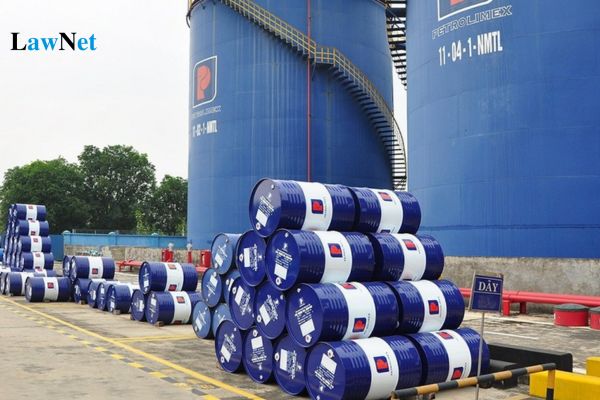What is the total amount of imported gasoline subject to the environmental protection tax in Vietnam?
What is the total amount of imported gasoline subject to the environmental protection tax in Vietnam?
Based on Article 3 of the Law on Environmental Protection Tax 2010, the regulations are as follows:
Taxable Objects
1. Gasoline, oil, and lubricants, including:
a) Gasoline, excluding ethanol;
b) Jet fuel;
c) Diesel oil;
d) Kerosene;
đ) Mazut oil;
e) Lubricating oil;
g) Lubricating grease.
2. Coal, including:
a) Lignite;
b) Anthracite (antraxit);
c) Fat coal;
d) Other types of coal.
3. Hydro-chloro-fluoro-carbon (HCFC) solution.
4. Plastic bags subject to the tax.
5. Herbicides restricted for use.
6. Termiticides restricted for use.
7. Wood preservatives restricted for use.
8. Warehouse disinfectants restricted for use.
9. Other taxable objects may be considered as necessary according to each period by the Standing Committee of the National Assembly.
The Government of Vietnam provides detailed regulations on this Article.
Also, based on Article 4 of the Law on Environmental Protection Tax 2010, the regulations are as follows:
Non-Taxable Objects
1. Goods not stated in Article 3 of this Law are not subject to the environmental protection tax.
2. Goods from Article 3 of this Law are not subject to environmental protection tax in the following cases:
a) Goods in transit or transshipped through the customs border of Vietnam, including goods transported from export countries to import countries through the customs border of Vietnam but not completing import procedures into Vietnam and not completing export procedures from Vietnam; goods in transit through the customs border of Vietnam based on agreements between the Government of Vietnam and foreign governments or agreements between agencies, representatives authorized by the Government of Vietnam and foreign governments according to the law;
b) Goods temporarily imported for re-export within the prescribed time limit according to the law;
c) Goods directly exported by the manufacturing facility or entrusted to an export business facility for export, except in the case of organizations, households, individuals purchasing goods subject to environmental protection tax for export.
Therefore, the regulation does not mention the total quantity of gasoline imported, as gasoline is subject to environmental protection tax except for some specific cases under Clause 2, Article 4 of the Law on Environmental Protection Tax 2010.

What is the total amount of imported gasoline subject to the environmental protection tax in Vietnam? (Image from the Internet)
If a business purchases lubricating oil from a unit that has imported it into Vietnam for resale, does it still have to pay environmental protection tax?
Based on Article 3 of the Law on Environmental Protection Tax 2010, the regulations are as follows:
Taxable Objects
1. Gasoline, oil, and lubricants, including:
a) Gasoline, excluding ethanol;
b) Jet fuel;
c) Diesel oil;
d) Kerosene;
đ) Mazut oil;
e) Lubricating oil;
g) Lubricating grease.
2. Coal, including:
a) Lignite;
b) Anthracite (antraxit);
c) Fat coal;
d) Other types of coal.
3. Hydro-chloro-fluoro-carbon (HCFC) solution.
4. Plastic bags subject to the tax.
5. Herbicides restricted for use.
6. Termiticides restricted for use.
7. Wood preservatives restricted for use.
8. Warehouse disinfectants restricted for use.
9. Other taxable objects may be considered as necessary according to each period by the Standing Committee of the National Assembly.
The Government of Vietnam provides detailed regulations on this Article.
Additionally, pursuant to Article 5 of the Law on Environmental Protection Tax 2010, the regulations are as follows:
Taxpayers
1. Taxpayers of environmental protection tax are organizations, households, individuals producing or importing goods subject to the tax as provided in Article 3 of this Law.
2. Taxpayers of environmental protection tax in some specific cases are stipulated as follows:
a) In the case of entrusted imports, the party receiving the entrusted import is the taxpayer;
b) In the case of organizations, households, individuals acting as focal points for purchasing small-scale mined coal without presenting documents proving the goods have been taxed for environmental protection, the organizations, households, individuals acting as focal points for purchase are taxpayers.
Therefore, lubricating oil is a taxable subject. However, the taxpayer of the environmental protection tax is the organization, household, or individual producing or importing goods subject to the tax as specified in Article 3 of the Law on Environmental Protection Tax 2010.
Thus, in the above case, since the enterprise is not involved in the production or import stage, it does not have to bear this tax.
What are general provisions on non-taxable goods and services in Vietnam?
Pursuant to Article 4 of the Law on Environmental Protection Tax 2010, objects not subject to the environmental protection tax include:
- Goods not provided for in Article 3 of this Law are not subject to environmental protection tax.
- Goods stipulated in Article 3 of the Law on Environmental Protection Tax 2010 are not subject to environmental protection tax in the following cases:
+ Goods in transit or transshipped through Vietnamese customs borders as legally defined, including goods transported from export countries to import countries through Vietnamese customs without undergoing import procedures into Vietnam and not undergoing export procedures from Vietnam; goods in transit through Vietnamese customs based on agreements signed between the Government of Vietnam and foreign governments or agreements between agencies, representatives authorized by the Government of Vietnam and foreign governments according to the law;
+ Goods temporarily imported for re-export within the period prescribed by law;
+ Goods directly exported by the production facilities or entrusted to business facilities for export, except in cases where organizations, families, and individuals purchase goods subject to the environmental protection tax for export.

